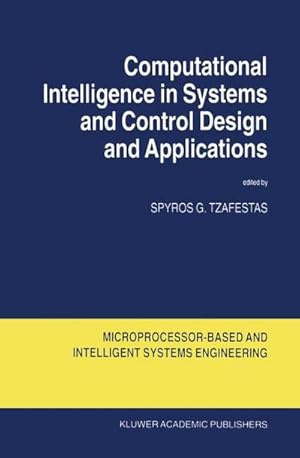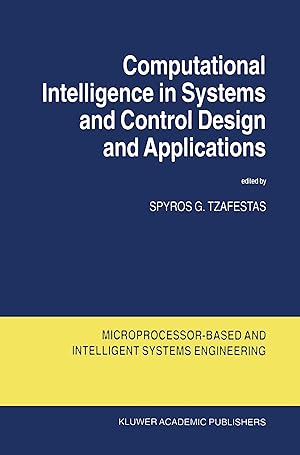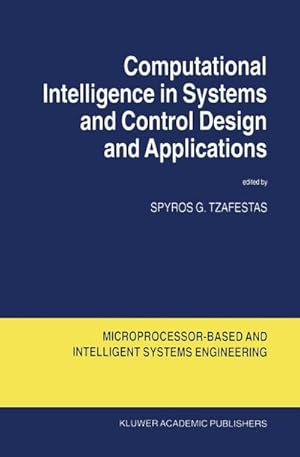computational intelligence systems control de tzafestas s g (13 resultados)
Filtros de búsqueda
Tipo de artículo
- Todos los tipos de productos
- Libros (13)
- Revistas y publicaciones (No hay ningún otro resultado que coincida con este filtro.)
- Cómics (No hay ningún otro resultado que coincida con este filtro.)
- Partituras (No hay ningún otro resultado que coincida con este filtro.)
- Arte, grabados y pósters (No hay ningún otro resultado que coincida con este filtro.)
- Fotografías (No hay ningún otro resultado que coincida con este filtro.)
- Mapas (No hay ningún otro resultado que coincida con este filtro.)
- Manuscritos y coleccionismo de papel (No hay ningún otro resultado que coincida con este filtro.)
Condición Más información
- Nuevo (12)
- Como nuevo, Excelente o Muy bueno (1)
- Bueno o Aceptable (No hay ningún otro resultado que coincida con este filtro.)
- Regular o Pobre (No hay ningún otro resultado que coincida con este filtro.)
- Tal como se indica (No hay ningún otro resultado que coincida con este filtro.)
Encuadernación
- Todas
- Tapa dura (No hay ningún otro resultado que coincida con este filtro.)
- Tapa blanda (13)
Más atributos
- Primera edición (2)
- Firmado (No hay ningún otro resultado que coincida con este filtro.)
- Sobrecubierta (No hay ningún otro resultado que coincida con este filtro.)
- Con imágenes (4)
- No impresión bajo demanda (9)
Idioma (1)
Precio
- Cualquier precio
- Menos de EUR 20 (No hay ningún otro resultado que coincida con este filtro.)
- EUR 20 a EUR 45 (No hay ningún otro resultado que coincida con este filtro.)
- Más de EUR 45
Gastos de envío gratis
Ubicación del vendedor
Valoración de los vendedores
-
Computational Intelligence in Systems and Control Design and Applications (Paperback)
Publicado por Kluwer Academic Publishers, New York, NY, 2001
ISBN 10: 1402003943 ISBN 13: 9781402003943
Idioma: Inglés
Librería: Grand Eagle Retail, Bensenville, IL, Estados Unidos de America
Original o primera edición
EUR 106,51
Convertir monedaGratis gastos de envío en Estados Unidos de AmericaCantidad disponible: 1 disponibles
Añadir al carritoPaperback. Condición: new. Paperback. This book contains thirty timely contributions in the emerging field of Computational Intelligence (CI) with reference to system control design and applications. The three basic constituents ofCI are neural networks (NNs). fuzzy logic (FL) I fuzzy reasoning (FR). and genetic algorithms (GAs). NNs mimic the distributed functioning of the human brain and consist of many. rather simple. building elements (called artificial neurons) which are controlled by adaptive parameters and are able to incorporate via learning the knowledge provided by the environment, and thus respond intelligently to new stimuli. Fuzzy logic (FL) provides the means to build systems that can reason linguistically under uncertainty like the human experts (common sense reasoning). Both NNs and FL I FR are among the most widely used tools for modeling unknown systems with nonlinear behavior. FL suits better when there is some kind of knowledge about the system. such as, for example, the linguistic information of a human expert. On the other hand. NNs possess unique learning and generalization capabilities that allow the user to construct very accurate models of nonlinear systems simply using input-output data. GAs offer an interesting set of generic tools for systematic random search optimization following the mechanisms of natural genetics. In hybrid Computational Intelligence - based systems these three tools (NNs, FL, GAs) are combined in several synergetic ways producing integrated tools with enhanced learning, generalization. universal approximation. reasoning and optimization abilities. Both NNs and FL I FR are among the most widely used tools for modeling unknown systems with nonlinear behavior. In hybrid Computational Intelligence - based systems these three tools (NNs, FL, GAs) are combined in several synergetic ways producing integrated tools with enhanced learning, generalization. Shipping may be from multiple locations in the US or from the UK, depending on stock availability.
-
Computational Intelligence in Systems and Control Design and Applications (Intelligent Systems, Control and Automation: Science and Engineering, 22)
Librería: Lucky's Textbooks, Dallas, TX, Estados Unidos de America
EUR 102,99
Convertir monedaEUR 3,43 gastos de envío en Estados Unidos de AmericaCantidad disponible: Más de 20 disponibles
Añadir al carritoCondición: New.
-
Computational Intelligence in Systems and Control Design and Applications (Intelligent Systems, Control and Automation: Science and Engineering, 22)
Librería: Ria Christie Collections, Uxbridge, Reino Unido
EUR 111,60
Convertir monedaEUR 13,79 gastos de envío desde Reino Unido a Estados Unidos de AmericaCantidad disponible: Más de 20 disponibles
Añadir al carritoCondición: New. In.
-
Computational Intelligence in Systems and Control Design and Applications
Publicado por Kluwer Academic Publishers, 2001
ISBN 10: 1402003943 ISBN 13: 9781402003943
Idioma: Inglés
Librería: Kennys Bookshop and Art Galleries Ltd., Galway, GY, Irlanda
EUR 130,00
Convertir monedaEUR 10,50 gastos de envío desde Irlanda a Estados Unidos de AmericaCantidad disponible: 15 disponibles
Añadir al carritoCondición: New. Editor(s): Tzafestas, S. G. Series: Intelligent Systems, Control and Automation: Science and Engineering. Num Pages: 376 pages, 24 black & white illustrations. BIC Classification: PBWX. Category: (G) General (US: Trade). Dimension: 235 x 155 x 19. Weight in Grams: 575. . 2001. Softcover reprint of the original 1st ed. 1999. Paperback. . . . .
-
Computational Intelligence in Systems and Control Design and Applications (Intelligent Systems, Control and Automation: Science and Engineering)
Librería: Revaluation Books, Exeter, Reino Unido
EUR 153,06
Convertir monedaEUR 14,39 gastos de envío desde Reino Unido a Estados Unidos de AmericaCantidad disponible: 2 disponibles
Añadir al carritoPaperback. Condición: Brand New. 376 pages. 9.21x6.14x0.77 inches. In Stock.
-
Computational Intelligence in Systems and Control Design and Applications
Publicado por Kluwer Academic Publishers, 2001
ISBN 10: 1402003943 ISBN 13: 9781402003943
Idioma: Inglés
Librería: Kennys Bookstore, Olney, MD, Estados Unidos de America
EUR 162,71
Convertir monedaEUR 9,02 gastos de envío en Estados Unidos de AmericaCantidad disponible: 15 disponibles
Añadir al carritoCondición: New. Editor(s): Tzafestas, S. G. Series: Intelligent Systems, Control and Automation: Science and Engineering. Num Pages: 376 pages, 24 black & white illustrations. BIC Classification: PBWX. Category: (G) General (US: Trade). Dimension: 235 x 155 x 19. Weight in Grams: 575. . 2001. Softcover reprint of the original 1st ed. 1999. Paperback. . . . . Books ship from the US and Ireland.
-
Computational Intelligence in Systems and Control Design and Applications
Publicado por Springer Netherlands, Springer Netherlands, 2001
ISBN 10: 1402003943 ISBN 13: 9781402003943
Idioma: Inglés
Librería: AHA-BUCH GmbH, Einbeck, Alemania
EUR 114,36
Convertir monedaEUR 62,85 gastos de envío desde Alemania a Estados Unidos de AmericaCantidad disponible: 1 disponibles
Añadir al carritoTaschenbuch. Condición: Neu. Druck auf Anfrage Neuware - Printed after ordering - This book contains thirty timely contributions in the emerging field of Computational Intelligence (CI) with reference to system control design and applications. The three basic constituents ofCI are neural networks (NNs). fuzzy logic (FL) I fuzzy reasoning (FR). and genetic algorithms (GAs). NNs mimic the distributed functioning of the human brain and consist of many. rather simple. building elements (called artificial neurons) which are controlled by adaptive parameters and are able to incorporate via learning the knowledge provided by the environment, and thus respond intelligently to new stimuli. Fuzzy logic (FL) provides the means to build systems that can reason linguistically under uncertainty like the human experts (common sense reasoning). Both NNs and FL I FR are among the most widely used tools for modeling unknown systems with nonlinear behavior. FL suits better when there is some kind of knowledge about the system. such as, for example, the linguistic information of a human expert. On the other hand. NNs possess unique learning and generalization capabilities that allow the user to construct very accurate models of nonlinear systems simply using input-output data. GAs offer an interesting set of generic tools for systematic random search optimization following the mechanisms of natural genetics. In hybrid Computational Intelligence - based systems these three tools (NNs, FL, GAs) are combined in several synergetic ways producing integrated tools with enhanced learning, generalization. universal approximation. reasoning and optimization abilities.
-
Computational Intelligence in Systems and Control Design and Applications (Intelligent Systems, Control and Automation: Science and Engineering, 22)
Librería: Mispah books, Redhill, SURRE, Reino Unido
EUR 168,37
Convertir monedaEUR 28,78 gastos de envío desde Reino Unido a Estados Unidos de AmericaCantidad disponible: 1 disponibles
Añadir al carritoPaperback. Condición: Like New. Like New. book.
-
Computational Intelligence in Systems and Control Design and Applications (Paperback)
Publicado por Kluwer Academic Publishers, New York, NY, 2001
ISBN 10: 1402003943 ISBN 13: 9781402003943
Idioma: Inglés
Librería: AussieBookSeller, Truganina, VIC, Australia
Original o primera edición
EUR 192,19
Convertir monedaEUR 31,77 gastos de envío desde Australia a Estados Unidos de AmericaCantidad disponible: 1 disponibles
Añadir al carritoPaperback. Condición: new. Paperback. This book contains thirty timely contributions in the emerging field of Computational Intelligence (CI) with reference to system control design and applications. The three basic constituents ofCI are neural networks (NNs). fuzzy logic (FL) I fuzzy reasoning (FR). and genetic algorithms (GAs). NNs mimic the distributed functioning of the human brain and consist of many. rather simple. building elements (called artificial neurons) which are controlled by adaptive parameters and are able to incorporate via learning the knowledge provided by the environment, and thus respond intelligently to new stimuli. Fuzzy logic (FL) provides the means to build systems that can reason linguistically under uncertainty like the human experts (common sense reasoning). Both NNs and FL I FR are among the most widely used tools for modeling unknown systems with nonlinear behavior. FL suits better when there is some kind of knowledge about the system. such as, for example, the linguistic information of a human expert. On the other hand. NNs possess unique learning and generalization capabilities that allow the user to construct very accurate models of nonlinear systems simply using input-output data. GAs offer an interesting set of generic tools for systematic random search optimization following the mechanisms of natural genetics. In hybrid Computational Intelligence - based systems these three tools (NNs, FL, GAs) are combined in several synergetic ways producing integrated tools with enhanced learning, generalization. universal approximation. reasoning and optimization abilities. Both NNs and FL I FR are among the most widely used tools for modeling unknown systems with nonlinear behavior. In hybrid Computational Intelligence - based systems these three tools (NNs, FL, GAs) are combined in several synergetic ways producing integrated tools with enhanced learning, generalization. Shipping may be from our Sydney, NSW warehouse or from our UK or US warehouse, depending on stock availability.
-
Computational Intelligence in Systems and Control Design and Applications
Publicado por Springer Netherlands, Springer Netherlands Nov 2001, 2001
ISBN 10: 1402003943 ISBN 13: 9781402003943
Idioma: Inglés
Librería: BuchWeltWeit Ludwig Meier e.K., Bergisch Gladbach, Alemania
EUR 106,99
Convertir monedaEUR 23,00 gastos de envío desde Alemania a Estados Unidos de AmericaCantidad disponible: 2 disponibles
Añadir al carritoTaschenbuch. Condición: Neu. This item is printed on demand - it takes 3-4 days longer - Neuware -This book contains thirty timely contributions in the emerging field of Computational Intelligence (CI) with reference to system control design and applications. The three basic constituents ofCI are neural networks (NNs). fuzzy logic (FL) I fuzzy reasoning (FR). and genetic algorithms (GAs). NNs mimic the distributed functioning of the human brain and consist of many. rather simple. building elements (called artificial neurons) which are controlled by adaptive parameters and are able to incorporate via learning the knowledge provided by the environment, and thus respond intelligently to new stimuli. Fuzzy logic (FL) provides the means to build systems that can reason linguistically under uncertainty like the human experts (common sense reasoning). Both NNs and FL I FR are among the most widely used tools for modeling unknown systems with nonlinear behavior. FL suits better when there is some kind of knowledge about the system. such as, for example, the linguistic information of a human expert. On the other hand. NNs possess unique learning and generalization capabilities that allow the user to construct very accurate models of nonlinear systems simply using input-output data. GAs offer an interesting set of generic tools for systematic random search optimization following the mechanisms of natural genetics. In hybrid Computational Intelligence - based systems these three tools (NNs, FL, GAs) are combined in several synergetic ways producing integrated tools with enhanced learning, generalization. universal approximation. reasoning and optimization abilities. 376 pp. Englisch.
-
Computational Intelligence in Systems and Control Design and Applications
Librería: moluna, Greven, Alemania
EUR 92,27
Convertir monedaEUR 48,99 gastos de envío desde Alemania a Estados Unidos de AmericaCantidad disponible: Más de 20 disponibles
Añadir al carritoCondición: New. Dieser Artikel ist ein Print on Demand Artikel und wird nach Ihrer Bestellung fuer Sie gedruckt. This book contains thirty timely contributions in the emerging field of Computational Intelligence (CI) with reference to system control design and applications. The three basic constituents ofCI are neural networks (NNs). fuzzy logic (FL) I fuzzy reasoning.
-
Computational Intelligence in Systems and Control Design and Applications
Publicado por Springer-Verlag New York Inc., 2001
ISBN 10: 1402003943 ISBN 13: 9781402003943
Idioma: Inglés
Librería: THE SAINT BOOKSTORE, Southport, Reino Unido
EUR 135,96
Convertir monedaEUR 18,79 gastos de envío desde Reino Unido a Estados Unidos de AmericaCantidad disponible: Más de 20 disponibles
Añadir al carritoPaperback / softback. Condición: New. This item is printed on demand. New copy - Usually dispatched within 5-9 working days 557.
-
Computational Intelligence in Systems and Control Design and Applications
Publicado por Springer Netherlands, Springer Netherlands Nov 2001, 2001
ISBN 10: 1402003943 ISBN 13: 9781402003943
Idioma: Inglés
Librería: buchversandmimpf2000, Emtmannsberg, BAYE, Alemania
EUR 106,99
Convertir monedaEUR 60,00 gastos de envío desde Alemania a Estados Unidos de AmericaCantidad disponible: 1 disponibles
Añadir al carritoTaschenbuch. Condición: Neu. This item is printed on demand - Print on Demand Titel. Neuware -This book contains thirty timely contributions in the emerging field of Computational Intelligence (CI) with reference to system control design and applications. The three basic constituents ofCI are neural networks (NNs). fuzzy logic (FL) I fuzzy reasoning (FR). and genetic algorithms (GAs). NNs mimic the distributed functioning of the human brain and consist of many. rather simple. building elements (called artificial neurons) which are controlled by adaptive parameters and are able to incorporate via learning the knowledge provided by the environment, and thus respond intelligently to new stimuli. Fuzzy logic (FL) provides the means to build systems that can reason linguistically under uncertainty like the human experts (common sense reasoning). Both NNs and FL I FR are among the most widely used tools for modeling unknown systems with nonlinear behavior. FL suits better when there is some kind of knowledge about the system. such as, for example, the linguistic information of a human expert. On the other hand. NNs possess unique learning and generalization capabilities that allow the user to construct very accurate models of nonlinear systems simply using input-output data. GAs offer an interesting set of generic tools for systematic random search optimization following the mechanisms of natural genetics. In hybrid Computational Intelligence - based systems these three tools (NNs, FL, GAs) are combined in several synergetic ways producing integrated tools with enhanced learning, generalization. universal approximation. reasoning and optimization abilities.Springer Verlag GmbH, Tiergartenstr. 17, 69121 Heidelberg 376 pp. Englisch.






